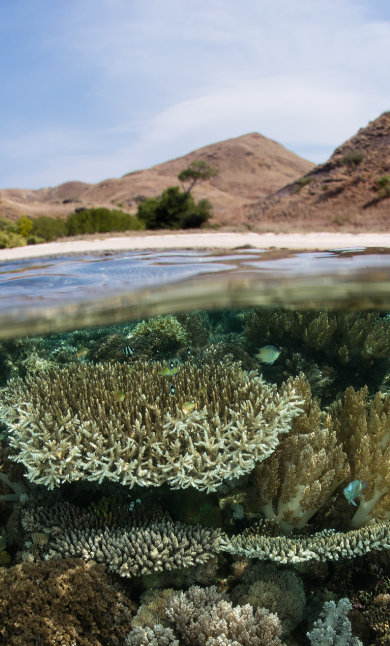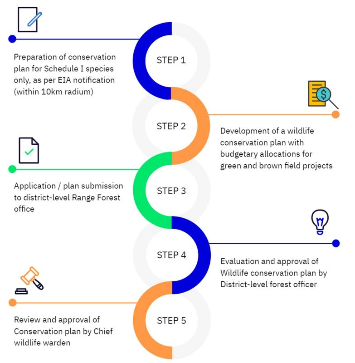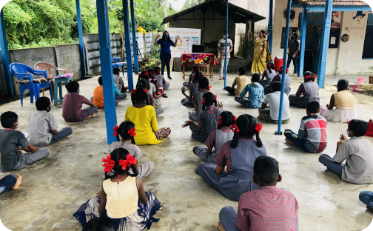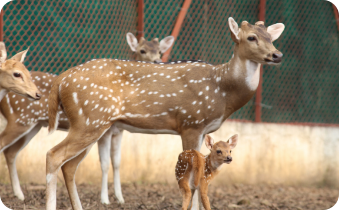
Please fill in the details below:

UPL, one of the leading agrochemical organizations, has adopted a top-to-bottom-driven management approach to mitigate biodiversity risks. The company recognizes the importance of preserving biodiversity and the need to minimize the impact of its operations on the environment. UPL's senior leadership has taken a proactive role in promoting biodiversity conservation, and the company has established a comprehensive biodiversity policy that guides its operations.
To implement this policy, UPL has integrated biodiversity risk management into its decision-making processes and product development strategies. The company works with experts to assess the impact of its operations on biodiversity as a part of its environmental impact assessment process and takes steps to reduce any negative effects. UPL also collaborates with local communities, non-governmental organizations, and other stakeholders to develop sustainable practices that support biodiversity conservation.
Download PDF
At the same time, UPL provides training and awareness programs to all its employees to help them understand the importance of biodiversity conservation and to encourage them to participate actively in the company's efforts. UPL's top-to-bottom-driven management approach for biodiversity risk management has helped the company to create a culture of environmental responsibility and sustainability, which has had a positive impact on biodiversity conservation in the regions where it operates.
Download PDF
The activities done for conservation of schedule 1 species in vicinity of operations is given in a table below.
| UPL Unit | Activities Performed |
|---|---|
| Unit 04 – India | - Plantation |
| - Water Storage tanks for Wild animals | |
| - Local School Awareness | |
| Unit 05 & Unit 15 – Jhagadia | - Facility provided to conserve wildlife |
| Unit 12 -Dahej | - Revival of Wildlife rescue centre at Vagra |
UPL Limited believes that businesses and biodiversity are closely interlinked. We recognise
sustainability of both our business and society depends on the natural capital and biodiversity linked ecosystem.
Before starting construction of any technical production unit, at UPL we undertake a detailed Environment
Impact assessment (EIA) in which the impact on biodiversity deeply studied and we develop the conservation plan to
protect biodiversity.
We conducted EIA studies to assess the impacts of its operation on nearby biodiversity and surrounding environment.
The findings of the study illustrates that no significant negative impact has been observed on the native flora and fauna.
Our commitment towards continual improvement is triggering conservation of Schedule 1 species in vicinity of
operations under The Wildlife (Protection) Act 1978, we have developed wildlife conservation plan in
consultation with state forest department, Government of Gujarat. The prepared wildlife conservation plans
with activity and budget have been approved by Chief Wildlife Warden of state forest department. The implementation
of wildlife conservation plan has been ensured and activities approved under wildlife conservation plan have been
reviewed and recognised by state forest department by making a site visit followed by NOC cum appreciation letter.

Environment conservation and responsible actions towards nature go a long way in making nature an alternate source of livelihood for the local population, who have close economic and cultural links with nature. The Intergovernmental Science-Policy Platform on Biodiversity and Ecosystem Services (IPBES) found that up to one million species are at risk of extinction, with many species declining in numbers, and populations becoming more fragmented.
The Vasudha programme aims at improving the quality of life of the natural habitat in the region through information dissemination, increased awareness, and focused efforts to preserve and protect the same.

Eco Clubs have been formed to propagate environment initiatives through school students. Tree plantation, maintaining an ecologically balanced community, optimal usage of environmental resources is some of the areas focused upon to build an eco-sensitive future generation.
Eco-Clubs Have 4000+ Students As Eco Warriors For Environment Conservation Reaching Out To Another 10,000+ Students.
A more eco sensitive community has been created with 20,000+ man-hours of mentoring

Sarus Crane Project
Sarus Cranes are categorized as vulnerable in the IUCN Red list in India. They are dependent on human support and peaceful coexistence for their survival. The Sarus Crane conservation efforts were initiated 5 years back in Kheda and Anand district of Gujarat. Since then, a participatory approach involving farmers and other stakeholders has been followed for their conservation. Efforts are focused on mapping Sarus distribution in the region, providing protection and fledging support to the species and giving them a friendly environment to coexist with the farming community. Awareness programs are conducted round the year to sensitize the community.
Programs saw participation from 4000+ stakeholders in 2021-22
Youth From 35 Villages Voluntarily Work Towards Protection Of The Species
Sampling Planted To Enhance The Biodiversity Of The Region In FY 22
Sarus Cranes Documented In 2020-21 As Against 500 In 2016-17

Khambhat Vulture Conservation Project
The species is listed as Critically Endangered under the IUCN Red List since year 2000 and protected under Wildlife Protection Act 1972, Schedule I species, because of the rapid population decline and slow breeding. UPL envisions documenting the population and breeding of the species over period and finding ways to reduce the threat to their breeding and roosting locations in partnership with the local community.
White - Rumped Vultures Have Been Documented By The Team In The Khambhat Region Of Gujarat

Partnership with Mwalua Wildlife Trust
UPL Ltd. is supporting the Mwalua Wildlife Trust in this initiative. The partnership model envisages empowering local communities to minimize humanwildlife conflict by giving alternative way which is introducing sunflower in their farms instead of corn that is always eaten by elephants. We are motivating the local farmers to take up sunflower cultivation. Sunflowers help preserve bees and the bees help preserve the elephants by making them stay away from the farms as elephants are afraid of the insects’ buzzing. So the program is saving elephants and bees, and helping people as well.

Mangrove plantation
Mangrove plantation in the coastal belt helps in reclaiming land from the sea and prevents further soil erosion. It also maintains ecological balance in the region.
Mangroves Have Been Planted In Coastal Belts Of Gujarat
Acres Of Coastal Belt In Gujarat Has Been Reclaimed Preventing Soil Erosion And Flooding Through Mangrove Restoration.

Water Conservation
Water is at the centre of all nature conservation efforts and hence a focused effort is made to create new structures, rebuild the dilapidated ones, deepen existing wells and ponds, create new ones and recharge bore wells amongst many other such efforts.
Water conservation structures have been built in the last 5 years in Gujarat

UPL Social Forestry
The community is encouraged to plant trees on village common land, government wasteland and Panchayat land under Social Forestry. It also aims to encourage people to plant trees to meet the growing demand for timber, fuel wood, fodder, and other products, thereby reducing pressure on traditional forest areas while recognising local communities' rights to forest resources and encouraging rural participation in resource management
Acres Of Barren Community Land Has Been Converted Into Flourishing Forests

The Urban Plants Project (Barranquilla, Colombia)
Aligned with our OpenAg purpose, we developed the Urban Plants project and we work on the construction of the largest urban agriculture circuit in the city. Started in 2019, with Urban Plants we have achieved the installation of vegetable gardens in community schools, Santa Magdalena Sofia District School and El Salvador Christian School and training of children and their families as Urban Farmers. The initiative has also helped in connecting the children of the city with nature, providing fresh food for the tables of the families, and contributing to the creation of green belts to strengthen the city's resilience to climate change.
People Benefited
Ton+ Recycled
Training Hours
M2 Greenery Increased
| Biodiversity Conservation Projects | External Partner/Institutions | UPL’s Support Type |
|---|---|---|
| Deer & Ungulate Breeding Project | Nature Club Surat (NGO) and Forest Department (Gujarat) | Project Implementation & Technical Guidance |
| Social Forestry Project – Pulwama Shahid Van | Enviro Cretext-startator Foundation | Project Implementation |
| Eco Club Project | Gujarat Ecological Education and Research (GEER) Foundation is an autonomous body, set up in 1982 by the Forests & Environment Department, Government of Gujarat & Primary and High School (Education Department) | Knowledge Partner |
| Enriching soil quality by promoting vermicomposting for Organic Manure | Local Farmers from Unitya, Sardarpura, Kharchi, Kapalsadi, Fulwadi region | Capacity Building; Vermi-Beds, worms, on-site mentoring by UPL |
| UPL Social Forestry |
1. Involvement of Gram Panchayat 2. Interested Local Community. 3. Forest Department 4. WAU Volunteers 5. Vendor/ Contractor |
Planning, identification of the species, user rights to sustain the forestry plantation. Initiating Community Engagement and Awareness program. Providing technical knowledge and saplings for plantation drive. Aiding the community in successfully executing the program after the detailed planning and performing continuous follow ups with the community to sustain the plantation. |
The Food and Agriculture Organization of the United Nations (FAO) reported that around 25% of the world's plant genetic resources are threatened, and around 17% of livestock breeds are at risk of extinction. UPL, being a global agrochemical company, has embraced an eco-conscious value chain approach that encompasses the entire life cycle of its products. The company has implemented a sustainable sourcing strategy that emphasizes responsible procurement practices, ensuring that raw materials are sourced from suppliers who meet the company's environmental and social standards. UPL has also implemented eco-friendly manufacturing processes that reduce energy consumption and minimize waste generation. The company has invested in research and development to develop environmentally friendly formulations and products that are less harmful to the environment, including those that are based on biological inputs. UPL's eco-conscious value chain approach extends to the distribution and usage of its products UPL also provides its customers with guidance on sustainable agriculture practices that reduce the use of chemicals and promote biodiversity conservation. By adopting an eco-conscious value chain approach, UPL has demonstrated its commitment to sustainability and environmental responsibility. The company's efforts have helped to reduce its impact on the environment and promote sustainable agriculture practices, ultimately contributing to the preservation of natural resources and biodiversity conservation.
DISCLAIMER
“UPL and its subsidiaries have made every attempt to ensure accuracy of the information provided on this website. However, this is a global webpage with access to different geographies for wider reach and greater awareness of UPL. In the course of doing the same, UPL has used Weglot translator plugin to cover the language of this website from English to select regional languages.
UPL therefore, does not accept any responsibility or liability on the nature, standard or the accuracy of the translation and cannot take responsibility for any type of inaccurate contextual meaning in the event of a mismatch from English to a regional language.”